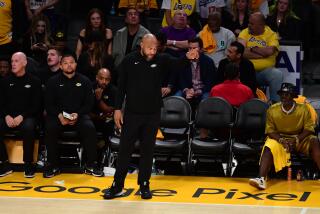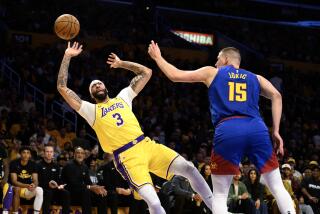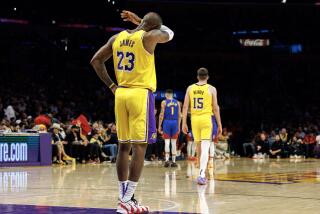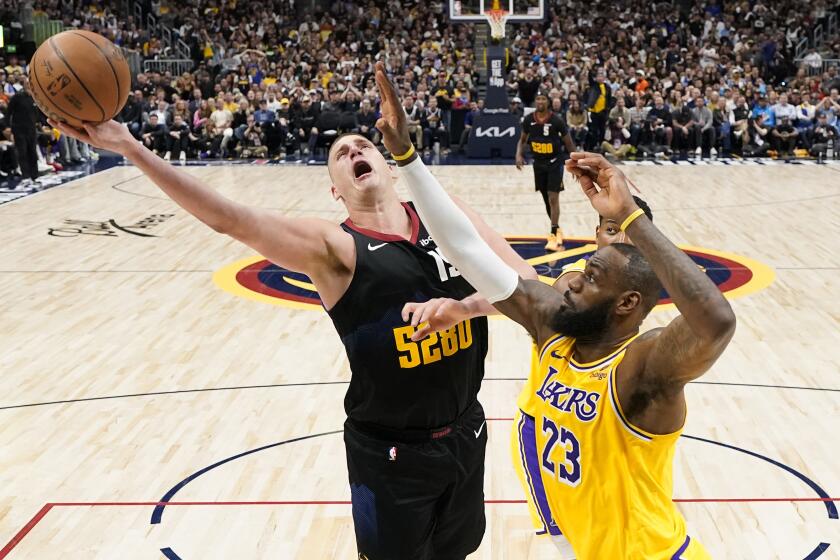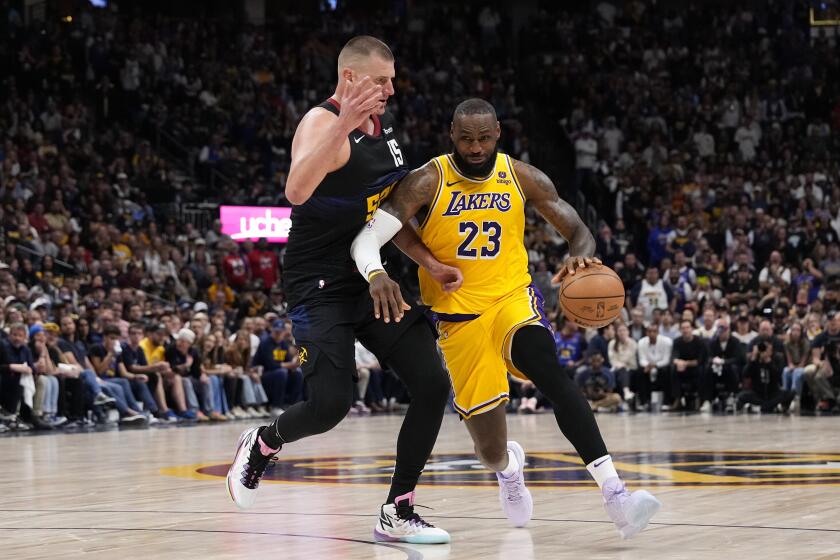Some Details of Bryant Accuser’s Sex Life Allowed
Evidence that Kobe Bryant’s accuser had sex with another man close to the time she says the Laker star raped her, and that she had sex with two key witnesses, can be introduced at trial, a judge ruled Friday.
The decision was a big victory for Bryant, who has said he and the woman, now 20, had consensual sex at a Colorado mountain resort June 30, 2003.
Bryant, 25, has pleaded not guilty to a charge of felony sexual assault. The trial is scheduled to begin Aug. 27 in Eagle County, Colo. If convicted, Bryant faces four years to life in prison or 20 years to life on probation, and a fine up to $750,000.
In his ruling, District Judge Terry Ruckriegle said details of the woman’s sexual activities in the 72 hours before a medical examination -- which was taken 15 hours after the alleged rape -- could help determine the cause of her injuries and the origin of semen and sperm found on swabs taken at the examination.
The judge also ruled that evidence about the woman’s relationship with two specific witnesses was admissible. The witnesses are thought to be Bobby Pietrack, a bellman who was the first person she spoke to after leaving Bryant’s hotel room, and Matt Herr, a former boyfriend with whom she exchanged a text message on July 1, 2003.
However, Ruckriegle ruled that evidence “of specific instances of sexual intercourse and conduct of the alleged victim or witnesses” outside the 72 hours would not be admissible.
Although under the Colorado rape-shield law, evidence of an alleged victim’s sexual conduct is presumed irrelevant, exceptions are allowed. To determine those exceptions, if any, Ruckriegle held a nine-day hearing in closed court that included testimony from 27 witnesses.
Prosecutors argued vigorously in court filings that the evidence was irrelevant to whether rape occurred and that looking into the woman’s sexual conduct with other men was “a humiliating and embarrassing fishing expedition” inadmissible under the rape-shield statute.
But Ruckriegle said the evidence could be used in describing to the jury the events that led up to the alleged rape and the events that occurred between the rape and the woman’s medical examination.
“The prosecution wants to say that the case begins when the accuser knocked at Kobe Bryant’s door and ends when she left his room,” legal analyst Larry Pozner said. “The defense is saying that what happened before, during and afterward is important. And with this ruling, the judge said, ‘I agree with the defense.’ ”
Prosecutors can appeal the ruling to the Colorado Supreme Court by arguing that Ruckriegle abused his discretion. The high court denied an earlier prosecution appeal seeking to limit the testimony of the accuser at a closed rape-shield hearing.
Attorneys on both sides are prohibited by a court order from commenting, but Krista Flannigan, a spokeswoman for the Eagle County district attorney’s office, said: “We have no plans of not moving forward with the prosecution. It’s just, what is [the prosecution] going to look like?”
In the ruling, Ruckriegle extended a deadline for a plea agreement until Wednesday. Under Colorado law, in order to plead guilty to a lesser charge, Bryant would still have to register as a sex offender.
An attorney for the accuser said Monday that his client had considered dropping out of the case twice -- when her name was mistakenly published on a court website and when a court reporter wrongly e-mailed transcripts from one of the closed hearings to seven news organizations. Prosecutors would have the option of proceeding without her.
“This ruling is profoundly bad news for the prosecution,” Pozner said. “What it does is keep prosecutors where they’ve been -- on their heels.”
Much of the evidence that will be admissible is graphic. Semen and sperm from someone other than Bryant were found on vaginal swabs taken from the woman during a next-day examination, as well as on other parts of her body. Prosecutors say the semen and sperm could have transferred from dirty underwear she wore to the examination, but the Colorado Bureau of Investigation -- the crime lab used by the district attorney’s office -- has joined defense experts in saying that is highly unlikely.
Ruckriegle said the evidence was relevant to the woman’s credibility. It also provides the defense with an explanation for the mild abrasions found near her vaginal area at the examination.
“The defense can now make the argument that those injuries weren’t caused by Kobe during consensual sex but that they were caused by her repetitive sexual activity,” legal analyst Jeralyn Merritt said.
Cynthia Stone, a spokeswoman for the Colorado Coalition Against Sexual Assault, said jurors must remember that “a woman can have sex with a lot of other people, but if she says no to someone and he forces her, she was raped.”
The ruling came as the U.S. Supreme Court was deciding whether to reverse an order by the Colorado Supreme Court prohibiting seven news organizations -- including The Times -- from publishing testimony from the last two days of the closed hearings on whether evidence about the woman’s sexual history would be allowed. The transcripts were mistakenly sent to the organizations June 24.
More to Read
All things Lakers, all the time.
Get all the Lakers news you need in Dan Woike's weekly newsletter.
You may occasionally receive promotional content from the Los Angeles Times.
